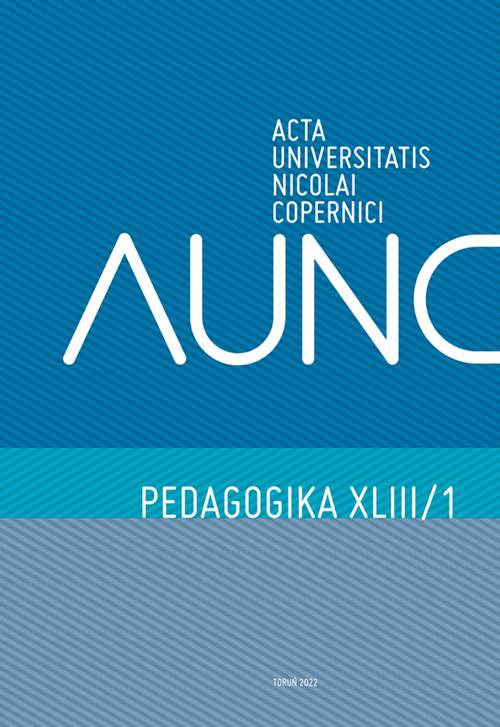The Sources of Social Acceptance of O therness . An Analysis of the Inner Identity Structure Mechanisms Responsible for Individual and Collective Identifications
DOI:
https://doi.org/10.12775/AUNC_PED.2022.002Keywords
social categorisation, social identity, individual identity, discrimination, exclusionAbstract
This paper focuses on attitudes of acceptance towards Otherness in the social world. The discussion is based on the assumptions of the social identity model, according to which exclusion and discrimination originate in the process of social categorisation.1 Seeking personal gain in the form of self-worth, people tend to favour members of the social category they identify with. Consequently, in an attempt to reduce exclusion and discrimination it is necessary to refer to the social ability to instil and activate the resource of universal categorisations as the foundation for social identifications and group processes. To comprehend society’spartial (and externally motivated) lability regarding the Other/Stranger, one must reconstruct the three principal dimensions of this emergent process – individual, interactive and institutional (as a reflection of the structural order). The article puts forward a thesis that highlights the unique role of the individual identity as an essential factor in generating a change of attitude towards the Other/Stranger and turning it into a much more open and accepting one.
References
Archer, Margaret Scotford. Człowieczeństwo: problem sprawstwa. Kraków: Zakład Wydawniczy “Nomos”, 2013.
Bokszański, Zbigniew. Indywidualizm a zmiana społeczna: Polacy wobec nowoczesności – raport z badań. Warszawa: Wydawnictwo Naukowe PWN, 2007.
Bokszański, Zbigniew. Tożsamości zbiorowe. Wyd. 1. Warszawa: Wydawnictwo Naukowe PWN, 2005.
Bokszański, Zbigniew. Tożsamość, interakcja, grupa: tożsamość jednostki w perspektywie teorii socjologicznej. Łódź: Wydawnictwo Uniwersytetu Łódzkiego, 1989.
Bolender, John. The Self-Organizing Social Mind. MIT Press, 2010.
Dick, Rolf, Ulrich Wagner, Jost Stellmacher, Oliver Christ. “Category salience and organizational identification”. Journal of Occupational and Organizational Psychology 78(2) (2005): 273–285.
Douglas, Mary. Jak myślą instytucje. Warszawa: Wydawnictwo Naukowe PWN, 2011.
Douglas, Mary. Symbole naturalne: rozważania o kosmologii: z nowym wprowadzeniem. Kraków: Wydawnictwo Uniwersytetu Jagiellońskiego, 2004.
Durkheim, Émile. The Division of Labour in Society. New York: The Free Press,1997.
Durkheim, Émile. The Elementary Forms of the Religious Life. London: Holen Street Press, 2012.
Durkheim, Émile. Samobójstwo. Warszawa: Oficyna Naukowa, 2011.
Durkheim, Émile, Marcel Mauss. Primitive Classification. University of Chicago Press, 1963.
Hermans, Hubert, Agnieszka Hermans-Konopka. Dialogical Self Theory: Positioning and Counter-Positioning in a Globalizing Society. 1st edition. Cambridge, UK; New York: Cambridge University Press, 2010.
Horowitz, Mardi J. “Self-Identity Theory and Research Methods”. Journal of Research Practice 8(2) (2012): 14.
James, William. Psychologia: kurs skrócony. Warszawa: Wydawnictwo Naukowe PWN, 2002.
Jenkins, Richard. 2000. “Categorization: Identity, Social Process and Epistemology”. Current Sociology 48(3): 7–25. https://doi.org/10.1177/0011392100048003003.
Kaniowski, Andrzej M. Supererogacja. Zagubiony wymiar etyki. Czyny chwalebne w etykach uniwersalistycznych. Warszawa: Oficyna Naukowa, 1999.
Lahire, Bernard. 2008. “The Individual and the Mixing of Genres: Cultural Dissonance and Self-Distinction”. Poetics 36(2–3): 166–188. https://doi.org/10.1016/j.poetic.2008.02.001.
Leszniewski, Tomasz. Tożsamość jednostki w zmieniającym się społeczeństwie. Toruń: Wydawnictwo Naukowe Uniwersytetu Mikołaja Kopernika, 2008.
Luhmann, Niklas. Systemy społeczne: zarys ogólnej teorii. Kraków: Zakład Wydawniczy “Nomos”, 2012.
Mead, George H. Mind, Self and Society. The Definitive Edition. Chicago–London:The University of Chicago Press, 2015.
Parsons, Talcott. System społeczny. Kraków: Zakład Wydawniczy “Nomos”, 2009.
Sennett, Richard. Szacunek w świecie nierówności. Warszawa: Warszawskie Wydawnictwo Literackie Muza, 2012.
Stets, James E., Peter J. Burke. 2014. “Self-Esteem and Identities”. Sociological Perspectives 57(4): 409–433. https://doi.org/10.1177/0731121414536141.
Strauss, Anselm Leonard. Zwierciadła i maski: w poszukiwaniu tożsamości. Kraków: Zakład Wydawniczy “Nomos”, 2013.
Tajfel, Henri, Michal G. Billig, Robert P. Bundy, Claude Flament. 1971. “Social Categorization and Intergroup Behaviour”. European Journal of Social Psychology 1(2): 149–178. https://doi.org/10.1002/ejsp.2420010202.
Taylor, Charles. Źródła podmiotowości: narodziny tożsamości nowoczesnej. Warszawa: Wydawnictwo Naukowe PWN, 2001.
Turner, John. “Ku poznawczej redefinicji pojęcia ‘grupy społecznej’”. In: Małe struktury społeczne, ed. Irena Machaj, 149–172. Lublin: UMCS, 1999.
Turner, John C. 1975. “Social Comparison and Social Identity: Some Prospects for Intergroup Behaviour”. European Journal of Social Psychology 5(1): 1–34. https://doi.org/10.1002/ejsp.2420050102.
Turner, John C., R.J. Brown, Henri Tajfel. 1979. “Social Comparison and Group Interest in Ingroup Favouritism”. European Journal of Social Psychology 9(2): 187–204. https://doi.org/10.1002/ejsp.2420090207.
Znaniecki, Florian. Ludzie teraźniejsi a cywilizacja przyszłości. Warszawa: Wydawnictwo Naukowe PWN, 2001.
Znaniecki, Florian. Relacje społeczne i role społeczne: niedokończona socjologia systematyczna. Warszawa: Wydawnictwo Naukowe PWN, 2011.
Downloads
Published
How to Cite
Issue
Section
License

This work is licensed under a Creative Commons Attribution-NoDerivatives 4.0 International License.
Stats
Number of views and downloads: 613
Number of citations: 0



